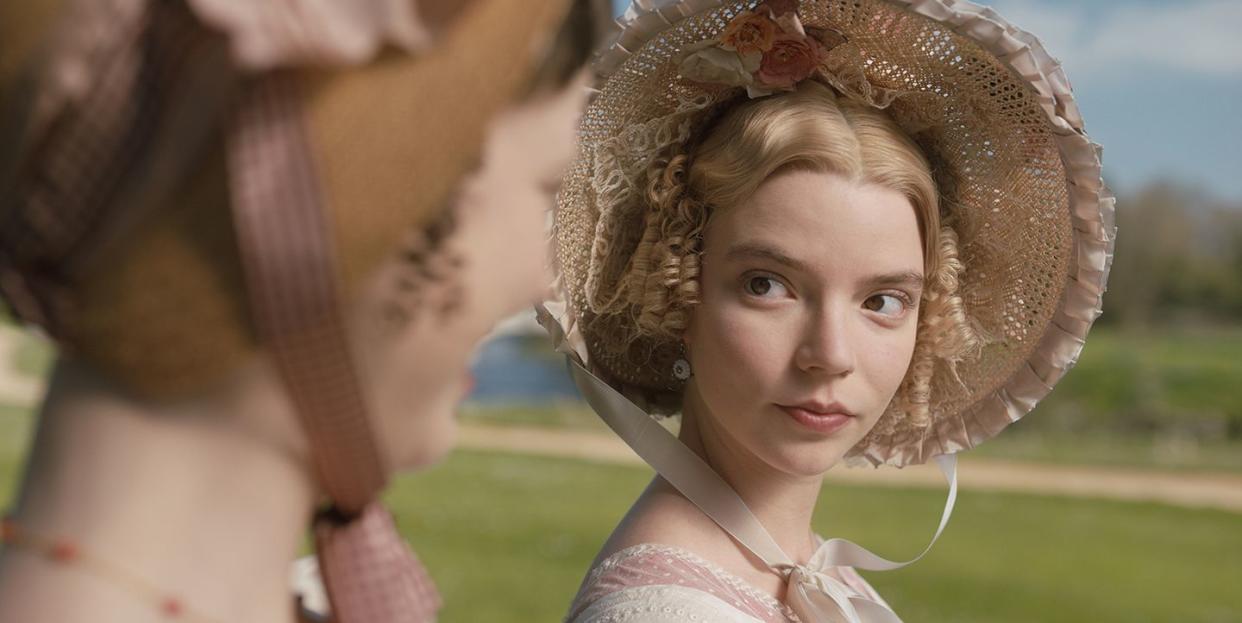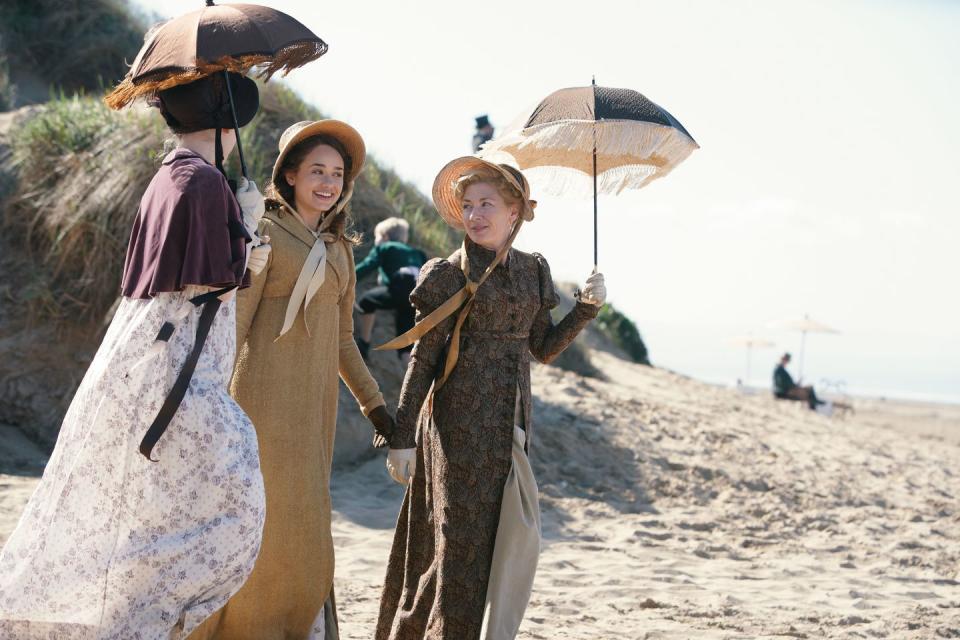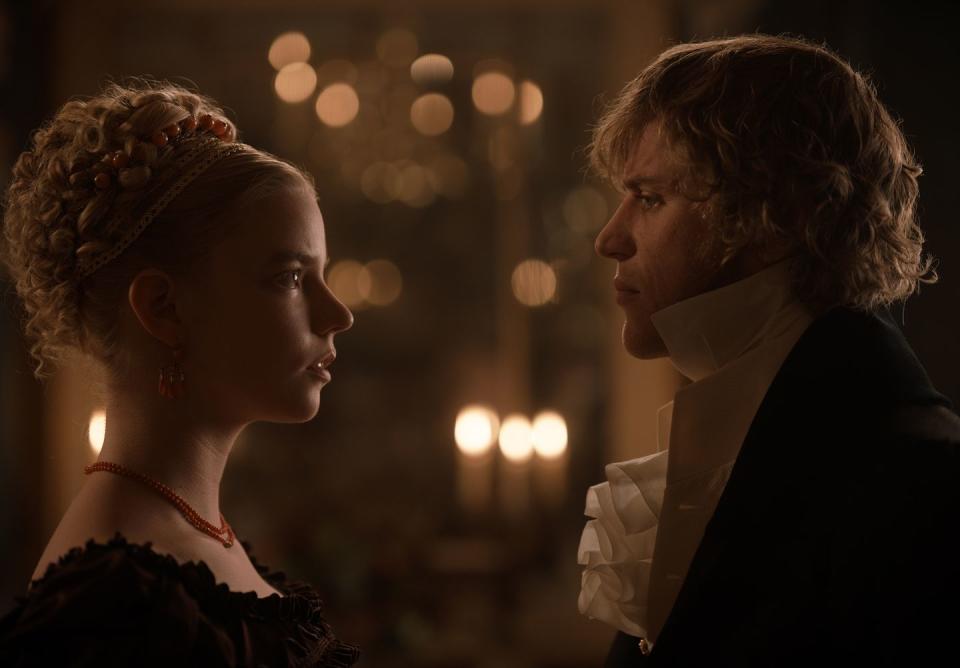An Expert Explains The Enduring Appeal of Jane Austen's Emma

Jane Austen’s Emma—the novel about nothing, but also about everything. While we may not have thought we needed another film adaptation, after Amy Heckerling’s triumphant Clueless and the 1996 period piece that catapulted Gwyneth Paltrow to fame, we are nonetheless receiving one, in the form of director Autumn de Wilde’s Emma., in theaters February 21.
In preparation for the new Emma’s release, T&C spoke to one of the nation’s foremost Jane Austen experts, Professor Deidre Lynch. Lynch is the Ernest Bernbaum Professor of Literature at Harvard University, and has published widely on the literature and culture of late-18th century and early-19th century Britain. She edited Janeites: Austen’s Disciples and Devotees, the Oxford World’s Classics edition of Austen’s Persuasion, the Romantic Period volume of The Norton Anthology of English Literature, and a 2016 edition of Austen’s Mansfield Park. She also teaches a popular course entitled "Jane Austen’s Fiction and Fans."
We spoke with her on Austen film adaptations, gendered audiences, the strength of Emma, and why Austen endures all these years later.
What do you think have been the biggest mistakes in Austen film and television adaptions?
That’s such an interesting question, and I did watch the first episode of Sanditon last night so it’s very much on my mind. I wasn’t very happy with it. I think the ones that I have found the least successful are the ones that almost imprison her in her moment. You’re getting so distracted by the historical accuracy of the costumes and the settings and all of the money they’ve spent on horses that you don’t actually get to pay that much attention to the story or to the characters. Those I find pretty deadly. I love things like Clueless and I love things like The Lizzie Bennet Diaries, in part because I think updating [the stories] actually gives you more opportunity to concentrate on character and story and not try to create this mythical place called "Jane Austen’s World."

What do you think have been some of the better adaptations?
Clueless, I think, is a brilliant adaptation of Emma. The Lizzie Bennet Diaries. Of the ones that are more historical, I really liked the 1995 Persuasion with Ciarán Hinds as Captain Wentworth, partly because it wasn’t so pretty all the time. I think that the people looked like people in ways that often that’s not an opportunity afforded to the actors in all of these adaptations—they’re a little too beautiful. The absolutely worst one of all time is the Billie Piper Mansfield Park. Oh my god, that’s a terrible, terrible adaptation.
If you were to consult for an Austen film adaptation, what advice would you give?
I think Austen’s great theme, in some ways, is inequality. One of the things that Sanditon did right is it does have a black character in it, and Austen wrote that in the six chapters that she managed to write of Sanditon before she got too ill. I think that if you’re going to set something in "Jane Austen’s World," quote unquote, it’s good to remember that not everybody in that world had the means to live comfortably. I think Austen does make us see sometimes the briefest glimpse [of inequality], that there’s a war going on, that there are people who are poor. I think I would kind of insist on that if I were asked to consult on an adaptation.

What do you think are the pros and cons between creating the more rigid, period adaptations versus the modernized retellings?
I think the cons—and I already said I really like the modernizations—the cons might be that those are never taken very seriously, right? That they seem like films for teenage girls alone or, at best, date movies or something like that. Austen was a very serious novelist, and I do think that there is a way in which claiming her for the genre of the rom-com has some real downsides. For one thing, it means that men don’t watch these adaptations, or only do so under duress. I’ve written about this before; there was no sense until the middle of the twentieth century that Austen was addressing a female audience exclusively. Lots of men read Austen, wrote about Austen, the first people that called themselves Janeites were men, not women.
Is that just the case for the modern rom-coms or could it be a problem with the period adaptations, too?
No, the period adaptations are just as bad in that way. Somehow, I just think that our world has become more rigidly gendered—and that’s especially true in film and television—and then that gets projected back onto Austen, because there have been so many television and film adaptations of her work.
About Emma specifically, why do you think that this novel resonates with people? It seems to keep getting brought back.
I would go back to what I said about inequality, because [the novel] really is Austen exploring how in this very claustrophobic world, people can get along when there is this sense that some people are superior to other people–Emma has a sense that she is positioned at the top of the Highbury hierarchy. So, I think that’s part of it, but also it’s just such a masterful exploration of how little we can know about other people, even when we have known them all our lives, and live in such close quarters. I think its appeal has a lot to do with the limits of our knowledge of each other, but also the really wonderful message that people can still surprise us. It’s such a habit-bound, routine-bound society and yet it’s also this novel where you go, "Oh my god," the first time you read it, "that was going on under our noses all along!" It’s also just so funny. It’s so much about how we find ways to get along with others, even in conditions in which we feel stuck with them. There’s an art of living that is taught in a novel of manners like Emma.

Are there any common perceptions about Emma that you feel are incorrect?
Emma, from its publication on, has posed this question, which is the difference between a book that is boring and a book that is about boredom. And it’s a fine line, right? It seems as though very little is happening, in part because you’re confined to Emma’s point of view. When the novel was first published, her publisher wrote a letter [and said], "It really is lacking in incident, isn’t it?" And that kind of misses the point. I think even at that moment, people were really interested in how a book about people who were bored—Mrs. Bates is a bore, Mr. Woodhouse is a bore, Mrs. Elton is a bore—how can such a book not be boring? It’s kind of plotless, at least on your first reading. And what is the interest of a plotless fiction?
How would you answer that question?
Well I would say that maybe it’s the distinction between reading about Mrs. Bates, which is a very different thing from living with Mrs. Bates. The novel is teaching us that difference.
Do you think we’re in an Austen renaissance right now?
I’m not sure. When I first started my career, it seemed like there was an adaptation every year. Things have slowed down a little bit. I do think there’s a lot more need for content as media expands and we have so many more channels and studios and the whole world of online media. It does seem as though there’s a desperate need to find stuff that’s out of copyright and claim it for yourself, because people are desperate for material. So, I’m less sure that we’re in an Austen renaissance than I was. God, though, the questions about civility that Austen writes certainly seem topical in the United States of 2020, don’t they? But, whether that’s going to create any sort of continued return to Austen, I’m not sure.

Why do you think Austen endures?
So many reasons. One is that we can still learn an incredible amount about what novels can do from reading her novels. The ways in which novels can give us the illusion of thinking as another person thinks and feeling as another person feels; her perfection of things like free indirect discourse have a lot to do with our sense that novels can give us another person’s psychology from the inside. Think about in Persuasion, the scene in which Captain Wentworth touches Anne Elliot’s back, as he lifts the child off her back. We feel that at the very moment Anne does. That’s something novels can do that no other art form can do as well. I think we can learn so much about what the novel as a form is capable of from reading Austen.
I also think she’s so funny and she’s so tricky—the irony in figuring out the lines between what a character is saying and what a narrator is saying. The sharp wit—Virginia Woolf has a line that, in the Austen canon, a single sentence can take a character’s head off. The put-downs and the edginess to the wit, that’s a reason to keep reading her as well.
And these are the things, of course, that the Hollywoodification of Austen has made harder to see. You don’t read the novels—or at least you don’t re-read the novels—just to get the hero and heroine to the wedding altar together. You read them because of that incredible linguistic dexterity.
It’s very hard to portray free indirect discourse on screen.
Absolutely. This was the problem with the episode of Sanditon that I watched. It keeps having to put in characters’ mouths things that the narrator imparts to us, and that doesn’t work out very well at all.
How would you advise someone to convey that successfully?
The Gwyneth Paltrow film of Emma does have a voiceover narrator once in a while and it doesn’t work out that well either. Clueless and then Emma, Approved, which is by the people that did The Lizzie Bennet Diaries, both have the Emma character serving as narrator and then use the contrast between what we’re seeing and what she’s seeing to create some of the same ironic effects. That works a little better, I think.
You have the audience hearing Emma’s internal narration.
Yes, exactly.

What’s your favorite Austen novel?
Oh god, it depends which one I’m teaching at the moment! Or, if I’m not teaching, which one I’m writing on at the moment. I am extremely fond of Emma. I’m blown away by the new things she’s doing in Persuasion and that syntax of agitation that she’s experimenting with there. Mansfield Park, because I am so interested in what Austen tells us about how someone internalizes their oppressor’s account of her. I just think the Mrs. Norris/Fanny dynamic in Mansfield Park is so psychologically acute and so interesting, and I do think that Austen’s effort to connect that in incredibly oblique ways to questions about imperial politics is really intriguing and exciting. So, those are my three.
And how are you feeling about this new version of Emma?
I hope the movie will be good. I like the person who is writing the screenplay—Eleanor Catton—I really liked her first novel a lot. So, I’m a little hopeful? But, it also looks like it’s going to be incredibly pretty [laughs] and, as you learned, I’m a little mistrustful of that prettiness.
You Might Also Like

